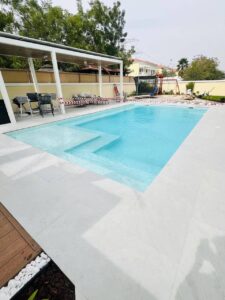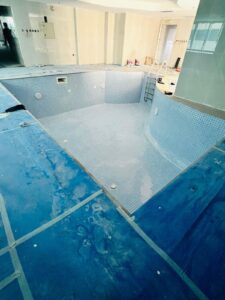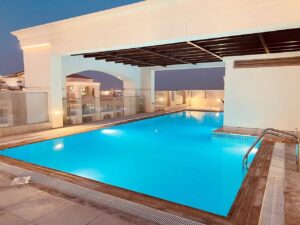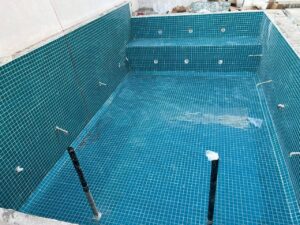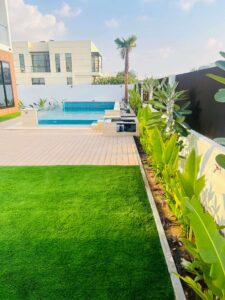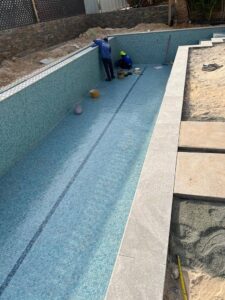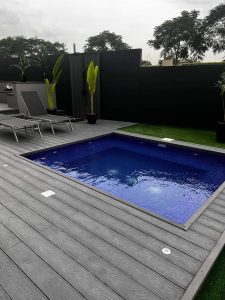Craftsmanship, technology & local expertise
Poolsco Landscaping LLC specializes in premium residential and boutique commercial swimming pool construction across Dubai. We combine modern design, sustainable systems (including energy-efficient pumps, LED lighting, and smart automation), and high-grade finishes to create swimming pools that elevate property value and enhance everyday living.
Custom Designs
Bespoke layouts, 3D visualizations, and finish selections tailored to your site and style.
Quality Build
Experienced project teams, licensed contractors, and strict QA at every step.
Smart & Sustainable
Pool automation, low-energy pumps, and water-saving filtration options.
Aftercare
Optional maintenance packages and renovation expertise to keep your pool flawless.
Why choose Poolsco?
- Expert Craftsmanship – Our team has years of experience and a proven track record in delivering premium-quality pools.
- Tailored Designs – We work closely with you to ensure your pool design meets your aesthetic and functional needs.
- Comprehensive Service – From design to maintenance, our full-service approach ensures a seamless process from start to finish.
Our team comprises highly trained professionals with extensive experience in pool design and construction. We stay updated on the latest industry standards and techniques, ensuring every project meets the highest levels of quality and precision.
We specialize in creating custom pools tailored to fit your unique needs and preferences. From intricate designs to advanced features like lighting and water systems, we have the expertise to bring even the most complex visions to life. Our team works with precision and innovation, ensuring seamless execution from start to finish.
We are dedicated to delivering excellence in every project we undertake. From the initial consultation to the final touches, our priority is your satisfaction. We commit to using only the highest quality materials, adhering to strict timelines, and maintaining open communication throughout the process to ensure your vision is fully realized.
Our Swimming Pool Construction Services
Custom Swimming Pool Construction
Tailor-made pools designed for your space and lifestyle.
Residential Pool Construction
Luxury pools for villas, homes, and farmhouses.
Commercial Pool Construction
Pools for hotels, gyms, and resorts.
Pool Renovation & Remodeling
Upgrade existing pools with modern features.
Water Features
Fountains, waterfalls
Spa & Jacuzzi
Jacuzzis & infinity edges.
Features & Enhancements
Enhance your swimming pool with premium features that add comfort, style, and functionality:
- Waterfalls, fountains & water features
- LED & underwater lighting
- Built-in seating & spa jets
- Pool heating systems
- Smart pool automation
- Decorative tiles & custom finishes
- Pool decks & surrounding landscaping
These upgrades turn your pool into a complete outdoor living experience.
Pool Safety & Compliance
Safety is a top priority in every pool we build. We incorporate essential safety features such as:
- Non-slip pool surfaces
- Safety fencing & barriers
- Pool covers & alarms
- Child-friendly designs
- Compliance with local safety standards
We ensure your pool is safe for families, children, and guests.
Swimming Pool Construction Cost
Every pool project is unique. The total cost depends on several factors, including:
- Pool size, shape & depth
- Construction materials
- Custom features & upgrades
- Landscaping & decking requirements
- Site conditions & accessibility
We provide transparent estimates with no hidden charges and help you choose options that match your budget.
Advanced Technology
We use modern pool construction technology to ensure efficiency, durability, and cost savings:
- Energy-efficient pumps & filtration systems
- Automated water treatment systems
- LED lighting for reduced energy consumption
- Eco-friendly pool solutions
- Low-maintenance equipment
Our solutions help reduce long-term operating costs while maintaining crystal-clear water.
Our Swimming Pool Construction Process
Building your dream pool should be an exciting and straightforward journey. As leading swimming pool contractors in Dubai, Poolsco Landscaping LLC has refined our process to ensure a seamless experience from the first conversation to the final handover. As trusted pool builders, we manage every detail with professionalism and expertise, keeping you informed and involved at every stage.
Consultation
Understanding your vision, budget, and site requirements.
Design
Custom pool design with layout, features, and materials.
Excavation
Site preparation and precise excavation for a strong foundation.
Construction
Structural work, plumbing, electrical, and pool shell installation.
Finishing
Tiling, decking, lighting, and final visual enhancements.
Handover
Final inspection, testing, and pool handover with guidance.
Our Swimming Pool Construction Projects
Client Testimonials
The team brought my backyard vision to life with incredible skill and creativity. The attention to detail and quality were outstanding. I couldn't be happier!
From the initial consultation to the finished project, the entire process was seamless. The team was professional, efficient, and went above and beyond to deliver perfection.
I’ve worked with other companies before, but this one truly stood out. They understood my needs and designed a beautiful patio space that my family enjoys every day.
The outdoor space you designed for us has completely transformed the way we use our home. The craftsmanship and attention to detail were exceptional!
The free consultation was insightful, and I immediately knew I was in good hands. The team was responsive and brought my ideas to reality with stunning precision.
The quality of work was top-notch from start to finish. My outdoor garden area now feels like an oasis, and I’m so glad I chose this company for the project.
Everyone I worked with was not only professional but also genuinely friendly and accommodating. They made sure every detail was just right!
Get A Free Quote
Fill out the form below and we will get back to you shortly. Your information is 100% secure.
Serving Dubai, UAE
Poolsco Landscaping LLC — We are professional swimming pool and landscaping contractors offering premium landscape services in Dubai, UAE for residential and commercial properties.

